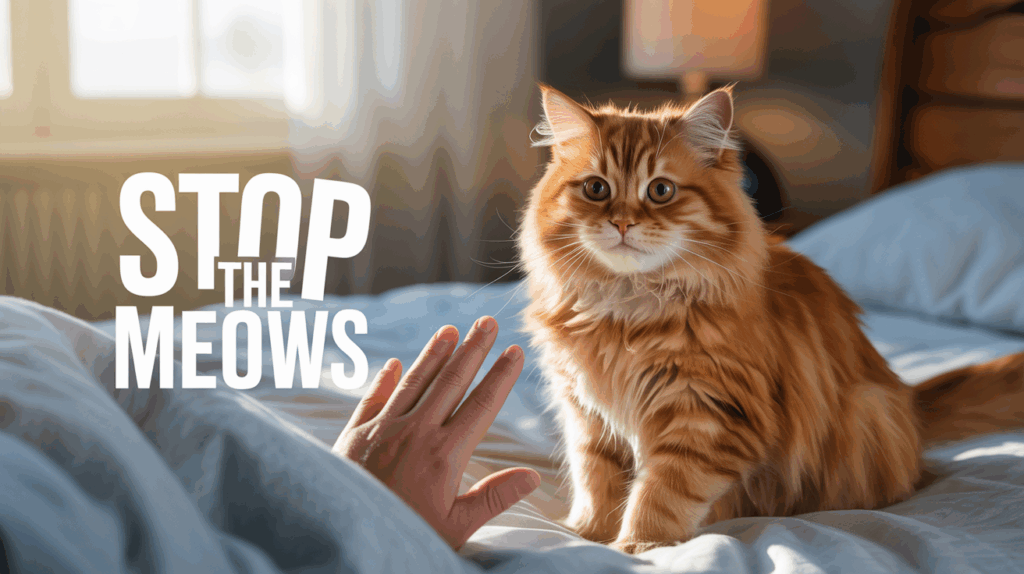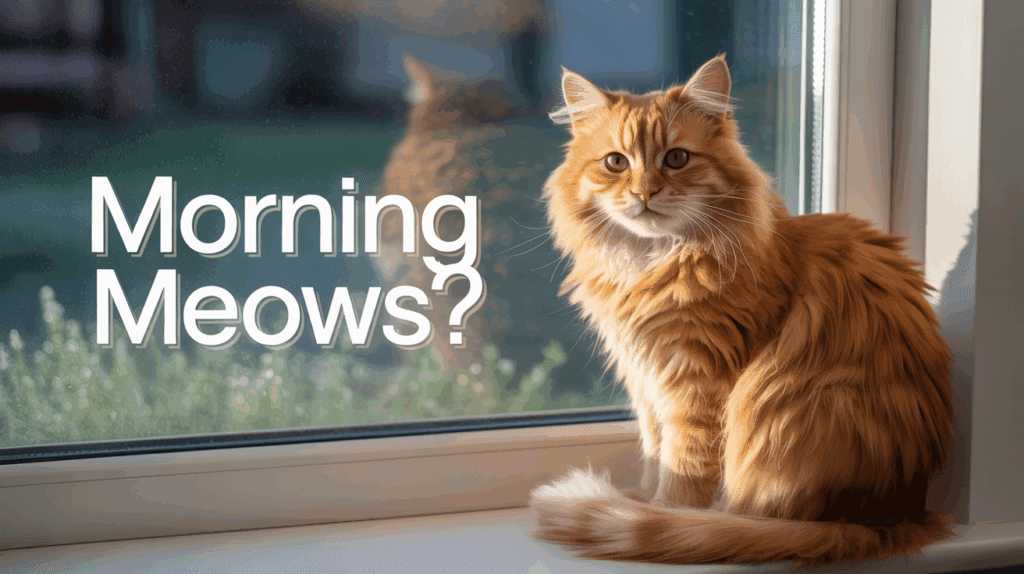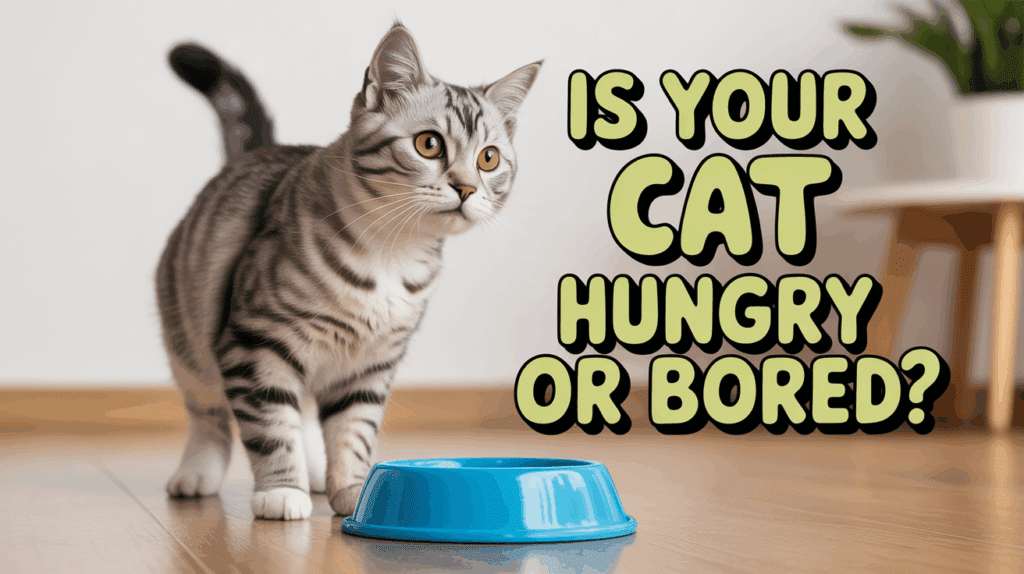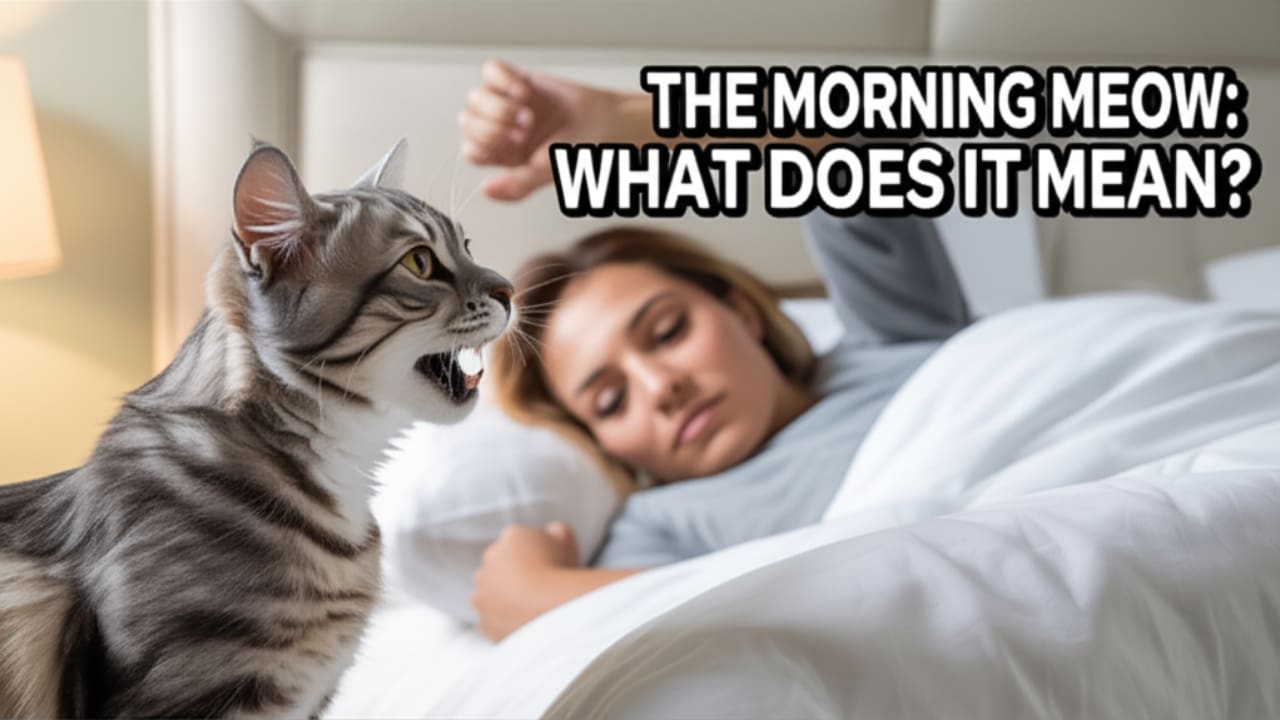Why Does My Cat Meow at Me in the Morning? (2025 Guide): Causes, Instincts, Habits, Medical Signs, and Training Tips
You’re jolted awake, again. That familiar meowing is the first thing you hear in the morning before sunrise. It’s been like this for the past few days? Weeks. Perhaps even months.
You’ve filled their bowl. The house is quiet. Nothing seems amiss, but your baby keeps doing this. Why? You ask. Why does my cat meow at me in the morning?
Well, this is likely thanks to a mix of reasons. And these include their instinct, learned routines, sometimes medical issues, and perhaps even just emotional needs.
Our cats are crepuscular creatures. This means they have way more energy around dawn or dusk. And that explains why they’re active at 4 or 5 a.m., waking you up for attention like they haven’t slept through the night.
Now, your cat’s meowing isn’t always about hunger. And actually, many cats vocalize even after eating. They most likely expect interaction and stimulation. This could be a learned behavior from the past, especially if you’re used to giving your little furball attention after food.
Your cat might even meow just because they are bored. But sometimes it could signal something more serious, like stress or age-related conditions (hyperthyroidism, for example).
So, in this article, we’ll learn to understand the triggers behind your cat’s meowing in the morning. We’ll also see how we can gently retrain their expectations (no punishment) and discuss when you should talk to a vet, especially if the vocalization becomes excessive or unusual.
Cat Morning Meowing Guide
Discover why your cat meows in the morning and get personalized solutions
Why Does My Cat Meow at Me in the Morning to Wake Up?

It’s persistent, perhaps even consistent. Your cat’s waking you up so early in the morning every day. They are your new alarm clock. It’s hard not to wonder in frustration. Why is my cat meowing at me in the morning?
Calm down. Let’s review the reasons first. There are usually logical explanations for this behavior, rooted in your cat’s instincts and routine.
Now, we all know that cats are creatures of habit. If you feed your little one at a specific time each morning, they’ll likely start thinking that that’s breakfast time. And there, this creates a learned behavior, and the meowing becomes something that says “Time to eat.”
Outside of food, your baby’s morning meows could be a way to just ask for attention. They probably want companionship or play. After all, they haven’t seen you for a long, quiet night (You lovebirds get it).
Another reason could be boredom. Your indoor cat is most likely restless in the morning before sunrise. That’s usually when their energy level is at its peak. They have been awake for hours while you snore, so meowing is the way to say, “Wake up! I’m ready to play.”
Then again, it could also be medical issues. If this behavior is sudden (as in your cat’s never done this before), they could be asking for help. Reasons could be discomfort, hunger because of a health issue, or even anxiety, in general.
Why Does My Cat Meow in the Morning So Much Compared to Other Times?

Yes, that furry alarm clock of yours is going off exactly at 5 a.m. It messes with your sleep, and the sun hasn’t even greeted you yet. Why does my cat meow a lot in the morning? Why this early? Why are they so quiet the rest of the day?
Your cat is crepuscular, and this means they are active during dawn and dusk. This makes them have way too much energy around the time you’re trying to sleep. It’s their biological rhythm telling them that they should do something with this energy.
Now, light changes might be a reason, too. Sunrise tells your baby that it’s a new day. And this could lead to expectations of you doing something for them, like feeding them or playing with them. It’s an association, basically. And that makes them really an alarm clock.
Another reason could be a lack of interaction. If you leave your baby alone throughout the day (you’re at work after all), they may front-load their interaction with you into the morning. It’s the time when you’re less busy and likely to touch them.
This, in turn, can become a habitual behavior. And if you do this often enough, it’s reinforced, and your cat will think that it’s your agreed-upon routine.
Why Does My Cat Meow at Me in the Morning, Loudly? Common Reasons

Your cat meowing is one thing. But it’s so loud, it’s not even a gentle wake-up call. And there goes your day, and you wonder. Why does my cat meow loudly in the morning?
Well, remember it’s about their internal clock, unmet needs, or perhaps a way to tell you something, something specific.
One common reason for your baby meowing this loudly is hunger. It’s nothing serious. If you give them food around the same time every day, they start expecting and demanding. If you’re not awake or not ready by the time they want their bowl filled, you’re in for an earful.
Then, there’s their yearn for your attention. After a long night of waiting for their pet parent, your baby is likely hungry for some affection and interaction. And if that’s your usual routine, your cat will expect it.
Something more pressing could involve stress and anxiety. If you’ve recently moved, made changes around the house, or if there are unfamiliar noises, your cat might get stressed out. Even loneliness can make them feel anxious. So, that meow might actually be a cry (metaphorically speaking).
Another reason is pent-up energy. If your furball doesn’t get enough stimulation, they sometimes release their frustration through those thunderous meows, asking for play. The environment (like birds chirping at sunrise) might get them excited to make noise, too.
That said, if the meowing is too excessive or unusual, there might be a need to pay your vet a visit. But let’s not jump to conclusions just yet.
The Indoor Cat Crisis: 2025 Enrichment Data
Alarming Statistics: A 2023 ASPCA study found that 55% of indoor cats show signs of boredom, such as excessive sleeping, overeating, and destructive behavior
Environmental Impact on Morning Meowing:
- If your cat is understimulated, they are three times more likely to meow excessively in the morning.
- If you provide proper environmental stimulation, it could reduce your cat’s stress-related behaviors by up to 30%.
Modern challenge: 70% of U.S. households own pets. But many cats spend hours alone during hybrid work schedules.
2025 Solution Kit:
- Puzzle feeders: Slow feeding could reduce morning food demands.
- Window perches: External stimulation may decrease your cat’s boredom-driven vocalization.
- Rotation toys: Such toys could prevent habituation and maintain interest.
- Vertical spaces: These can likely satisfy climbing instincts safely indoors.
Why Does My Cat Meow in the Morning After Eating? Behavioral Triggers Explained
Now, maybe your baby’s not the type to wake you up in the morning. But they’re meowing after food instead. Why? You should’ve just satisfied their craving, their basic need.
Well, know that this is most likely due to behavioral and emotional triggers rather than physical hunger.
Your cat might be meowing after eating to say that they are satisfied. Or they may be asking for affirmation or interaction from you. They may even feel like playing with you or getting groomed, especially if this has been the routine for them. In other words, they want your attention next.
Another reason could be just restlessness. Your little one might have too much energy after food, especially if your cat’s quite young or the energetic kind. So, if there’s no way to release that energy, trumpeting you is one way to go.
Learned behavior can be the other reason. If your cat’s previous meowing got them more food, attention, or some privileges, it might motivate them to keep doing so. It’s a hope for reward.
Why Does My Cat Wake Up and Meow at Me? Instincts and Routine Factors
So, your cat is like a ticking time bomb (a cute one). The first thing they do when they wake up is to meow at you. It feels like an urgent demand.
But more often than not, it’s simply just a natural way to express their instinct. It’s like us, stretching in the morning.
Your cat is likely anticipating something upon waking up. And when they see you, they quickly think of food, play, or interaction. Even if you haven’t reinforced this behavior, the consistency of what you do can teach your cat that meowing gets them results.
Also, instinctively, your cat is more active during early morning hours. It’s their crepuscular nature. If they wake up during this energy peak, you can be sure they want engagement from you. This is especially the case if there’s a lack of activity going on in the house.
For some sweeter cats, the meow is more about re-establishing social connection after a long night. You know how it is, just wanting a hug right after waking up. It’s like a “check-in” in your cats’ case, a cue that they’re ready to start the day with you.
Why Does My Cat Meow at 4 in the Morning? Sleep Disruption and Internal Clocks
Yes, it’s 3:59 a.m. One more minute to go, and there they go. It’s 4 a.m. Your cat is meowing. Their natural rhythm is so precise sometimes, and they are so sensitive in the morning.
For a lot of cats, 4 o’clock in the morning is that sweet spot for energy surge. It’s biologically wired for these crepuscular creatures.
Your cat’s internal clock is mostly reacting to the smallest morning stimulation. It could be subtle light changes, outdoor sounds, or even just their anticipation of waking you up. Hunger cues may be a reason, too, especially if you’ve fed them at an earlier time before.
Sometimes, their sleep disruption could be because of boredom. The lack of stimulation can get to your furry friend, especially when they are cooped up indoors. And when they wake up early with nothing to do, meowing follows. It’s to capture your attention or to let you know they want interaction.
You could try to re-adjust feeding times to realign expectations. You could also try giving your cat interactive toys before bed to wear them out a little. Make small changes so that you do not disrupt the routine too drastically. It’ll help your little one make the shift gradually.
Debunking the Myth: Why Does My Cat Meow at Me in the Morning?
Why does my cat meow at me in the morning? Well, there are times when your cat just wants food in the morning. But that is not always the reason. Yet, it’s a common assumption.
Your cat is unlikely to always be hungry. They might just have emotional needs, or they might just be responding to environmental cues. It could also just be a learned behavior from consistent associations.
Your little friend is smarter and more intelligent than you think. If their meowing has gotten them what they want previously, you can expect them to try the same move again. Over time, this lets them know that meowing is a tool they can use to get your attention or trigger a familiar routine.
Other than that, they could just be lonely or bored. They might just want social interaction. They love you after all (probably). After spending hours away from you at night, they can’t help wanting affection from you. And that excitement may manifest as meowing.
On the other end of the spectrum, your cat may just be expressing their comfort or emotional reassurance. It’s (or supposed to be, anyway) a cute way of re-establishing connection after the night.
Should You Call the Vet?
RED FLAGS – Call the Vet Immediately:
- Sudden onset morning meowing + hiding behavior
- Meowing accompanied by difficulty breathing or panting
- Morning vocalization + loss of appetite + lethargy
- Any change in litter box habits alongside increased vocalization
YELLOW FLAGS – Schedule a Vet Visit:
- Gradual increase in morning meowing over 2+ weeks
- Senior cat (10+ years) with new vocalization patterns
- Meowing accompanied by increased thirst/urination
GREEN FLAGS – Likely Behavioral:
- Consistent morning routine-based meowing
- Stops after feeding or attention
- No other physical symptoms present
When to Worry About Morning Meowing: Medical or Emotional Causes
Now, most of the time, morning meowings are harmless. They can be annoying, but usually nothing serious. They are most likely routine-based, too.
But, there are times when it could signal something more concerning. Your cat may be more vocal than usual all of a sudden, and this vocalization is persistent. Consider medical issues or even emotional distress.
Yes, your cat is likely to tell you something’s wrong with their meowing. They may be in pain, sick, or in discomfort. Some common medical conditions include hyperthyroidism, kidney disease, or cognitive dysfunction (especially in older cats). So, if your cat is restlessly meowing or disoriented, try scheduling a vet check. It’s better safe than sorry.
At times, it could be stress and anxiety. For example, if your cat is suffering from separation anxiety, their meowing could be a way to try to reconnect with you. Besides that, changes in the home (new pets, people, or routines) can stress them out. These things disrupt their sense of security, and it may manifest as loud meowing.
So, remember, observe the patterns. See if the meowing is sudden and persistent. Is it louder than usual? Does your cat’s behavior change? Call up your vet and ask for help.
2025 Veterinary Insights: Morning Meowing & Health
Recent data shows that 10% of cats over 10 years old develop hyperthyroidism. And 95% of hyperthyroid cases occur in senior cats. Morning vocalization can be an early sign, as hyperthyroid cats often show increased vocalization alongside hyperactivity.
2025 Clinical Data:
- Hyperthyroidism surge: Affects 10% of senior cats. This increases to 14% in cats over 13 years of age.
- Pain-related vocalization: Studies indicate that cats experiencing chronic pain frequently exhibit increased morning meowing. This is when cortisol levels naturally peak for your feline companion.
- Underdiagnosis concern: Veterinary behavior specialists report that excessive vocalization is often the first sign owners notice. But underlying pain conditions remain undiagnosed in many cases.
How to Gently Train Your Cat to Stop Meowing in the Morning
That’s right. You can train your furball, and you can finally stop asking questions like “Why does my cat meow at me in the morning?”
But note that you’ll need to be patient and consistent. And certainly, understand what’s reinforcing the behavior. Target the root and stop the association.
First, do not reward the behavior. They meow, you give, and the cycle repeats. That has to stop. You’re unintentionally encouraging your cat to meow, really. Instead, try getting an automatic feeder set to dispense food. This will get the “chore” off your hands. And your cat won’t be associating your face with breakfast.
Next, try to establish a calming nighttime routine. You can play with your cat before bed to burn off excess energy. That could help in reducing restlessness in the morning. Provide some environmental enrichment, too. Try puzzle feeders or window perches. These can help occupy your little one when they wake up.
It might be in your system to just respond to their meowing. But fight the urge. You need positive reinforcement, and there’s nothing positive about you giving in. Reward them when they’re quiet in the morning with attention or treats. Teach them that silence, not noise, can bring them rewards.
In short, reshape your cat’s expectations and set consistent boundaries. Be patient and slowly teach your little friend to understand it.
The Best Morning Routine for Cats That Meow at Dawn
Your cat might have a different sleep schedule from yours. But that doesn’t mean you can’t shape their behavior. The most important thing is to understand their internal clock. And know that your little one is likely to experience energy spikes during dusk or dawn.
Try creating a pre-bedtime play ritual to help burn off your little one’s pent-up energy. You could also use a timed feeder to help break the association between you and their food. Most importantly, remember to reinforce calm behavior by rewarding your cat with playtime, nutritional food, or treats.
We like Dr. Elsey’s products for their high-protein nutrition that can help regulate hunger. Their cleanprotein™ Homestyle Duck & Chicken Recipe Pouch uses real duck as the first ingredient, and it provides grain-free nutrition and omega-3 fatty acids. It is also free of gluten, GMOs, fillers, and artificial preservatives.
Dr. Elsey’s Homestyle Chicken Recipe Pouch offers similar benefits with high-quality chicken. The Salmon & Chicken Recipe Pouch further boosts the omega-3 profile with salmon for variety.
Dr. Elsey’s was founded by a veterinarian, Dr. Bruce Elsey, and his wife in 1987. The company focuses on a “cat before profit” motto and is rooted in science, compassion, and purpose. They design their products to help cats thrive and stay in loving homes where they belong.
Frequently Asked Questions About Cats Meowing in the Morning
1. Why do cats meow when they see you in the morning?
Think of it as a greeting. Or it could be to get your attention for food, play, or affection. It’s very likely that they learn to do so from observing your response.
2. Why do cats watch you sleep in the morning?
They’re probably anticipating for you to wake up. They likely want to start the routine. Or, they may just want to be close to you. It’s a quiet form of bonding and curiosity.
3. Should I ignore my cat meowing in the morning?
Yes, only if your cat is really healthy. It’s best to ignore your cat’s meowing so that you don’t reinforce the behavior. Let them learn that silence brings rewards instead.
4. How do I stop my cat from waking me up at 5 a.m.?
You can try setting an automatic feeder. It’s also a good idea to increase evening playtime and have a consistent morning routine. Don’t give your cat attention right when they start meowing.
5. Why are cats so needy in the morning?
It’s most likely loneliness or hunger. Sometimes, they’re anticipating activity. Your little one is probably eager for interaction and stimulation after a long night without you.
6. What does it mean when a cat meows persistently at dawn?
It can mean hunger, boredom, or even anxiety. In serious cases, it could be a sign of underlying medical issues. Observing patterns and symptoms. Find out the root cause, and call for help.
7. How does a cat’s circadian rhythm affect its morning behavior?
Cats are crepuscular. So, they’re naturally more active at dawn and dusk. It’s natural for them to have more energy in the early morning hours and want to vocalize.
8. Can medical issues cause early morning meowing in cats?
Yes, your cat may meow because of pain. There’s a possibility for hyperthyroidism, or even cognitive dysfunction, especially for older cats. So, observe closely.
9. Why do some cats meow more in the morning after eating?
This can be due to excitement. They may be anticipating play, or it could just be a learned habit. But this tells you that they want more than just food. They want your attention.
10. Can I train my cat to stay quiet in the morning?
Absolutely. Remember three things. Consistent routines, positive reinforcement, and nighttime enrichment. These are essential to help reduce early-morning meowing over time.
Case Study 2025: How Eevee’s 4 AM Meows Revealed Behavioral Patterns
The Challenge: Eevee is a 3-year-old spayed domestic shorthair. She began excessive meowing 2 weeks after adoption. Her guardian counted “208 meows before she gave up” during one morning episode.
.The Process:
- Initial Assessment: They ruled out medical causes through comprehensive bloodwork, thyroid testing, and blood pressure checks.
- Behavioral Analysis: They identified learned reinforcement patterns where attention followed meowing.
- Treatment Protocol: They implemented extinction training with differential reinforcement.
- Resolution: They achieved near-complete reduction in excessive vocalization through consistent behavioral modification.
Vet-Verified Outcome: The case shows how systematic behavioral intervention can resolve morning meowing when medical causes are ruled out.
Source: IAABC Journal of Animal Behavior Consulting, 2023
Why Does My Cat Meow at Me in the Morning: Creating a Calmer Morning Routine
Do you remember your question? Why does my cat meow at me in the morning?
You should know now that meowing in the morning isn’t always about food. It’s a way for your cat to communicate with you. And it’s tied to their instinct, routine, and emotional needs.
Learn to read your cat’s meowing. See what they’re trying to tell you. Respond with empathy, structure, and gentle training. You want to help them improve without compromising your bond (and your sleep, too).
Be patient and make adjustments. Tweak the feeding times gradually to get to what suits you both. Enrich your baby’s environment. If there’s a medical issue, get to it, and call your vet.
Trust your ability to interpret your cat’s cues. You’re their pet parent after all. Take small, consistent steps. And you’re bound to achieve a quieter, more harmonious morning routine.
Does your cat meow in the morning too? What time is your furry alarm clock set for? Share your experience with us in the comments below!


